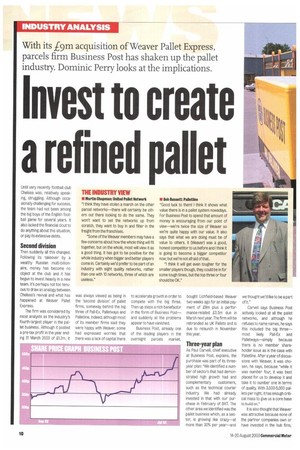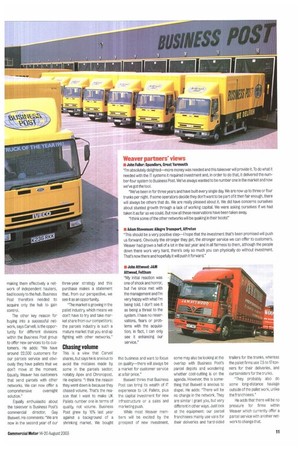Invest to create a refined pallet
Page 10

Page 11

If you've noticed an error in this article please click here to report it so we can fix it.
Until very recently football club Chelsea was, relatively speaking, struggling. Although occasionally challenging for success, the team had not been among the big boys of the English football game for several years. It also lacked the financial clout to do anything about this situation, or pay its extensive debts.
Second division
Then suddenly all this changed. Following its takeover by a wealthy Russian multi-billionaire, money has become no object at the club and it has begun to invest heavily in a new team. It's perhaps not too tenuous to draw an analogy between Chelsea's revival and what has happened at Weaver Pallet Express.
The firm was considered by most analysts as the industry's fourth-largest player in the pallet business. Although it posted a pre-tax profit in the year ending 31 March 2003 of £1.2m, it was always viewed as being in the 'second division' of pallet firms, someway behind the big three of Pall-Ex, Palletways and Palletline. Indeed, although most of its member firms said they were happy with Weaver, some had expressed worries that there was a lack of capital there to accelerate growth in order to compete with the big three. Then up steps a rich benefactor in the form of Business Post— and suddenly all the problems appear to have vanished.
Business Post, already one of the leading players in the overnight parcels market, bought Lichfield-based Weaver two weeks ago for an initial payment of am plus a performance-related 23.5m due in March next year. The firm will be rebranded as UK Pallets and is due to relaunch in November this year.
Three-year plan
As Paul Carvell, chief executive at Business Post, explains, the purchase was part of its threeyear plan: "We identified a number of sectors that had demonstrated high growth had and complementary customers, such as the technical courier industry. We had already invested in that with our purchase in February of BXT. The other area we identified was the pallet business which, as a sector, is growing like crazy—at more than 30% per year—and we thought we'd like to be a part of it."
Carvell says Business Post actively looked at all the pallet networks, and although he refuses to name names, he says this included the big three— most likely Pall-Ex and Palletways—simply because there is no member shareholder issue as is the case with Palletline. After a year of discussions with Weaver, it was chosen, he says, because "while it was number four, it was best placed for us to develop it and take it to number one in terms of quality. With 3,000-5,000 pallets per night, it has enough critical mass to give us a core base to build on."
It is also thought that Weaver was attractive because none of the partner companies own or have invested in the hub firm,
making them effectively a network of independent hauliers, tied loosely to the hub. Business Post therefore needed to acquire only the hub to gain control.
The other key reason for buying into a successful network, says Carvell, is the opportunity for different divisions within the Business Post group to offer new services to its customers. He adds: "We have around 22,000 customers for our parcels service and obviously they have pallets that we don't move at the moment. Equally, Weaver has customers that send parcels with other networks. We can now offer a comprehensive overnight solution."
Equally enthusiastic about the takeover is Business Post's commercial director, Guy Buswell. He comments: "We are now in the second year of our three-year strategy and this purchase makes a statement that, from our perspective, we see it as an opportunity.
"The market is growing in the pallet industry, which means we don't have to try and take market share from our competitors; the parcels industry is such a mature market that you end up fighting with other networks."
Chasing volume
This is a view that Carvell shares, but says he is anxious to avoid the mistakes made by some in the parcels sector, notably Apex and Chronopost. He explains: "I think the reason they went down is because they chased volume. That's the reason that I want to make UK Pallets number one in terms of quality, not volume, Business Post grew by 16% last year against a background of a shrinking market. We bought this business and want to focus on quality—there will always be a market for customer service at a fair price."
Buswell thinks that Business Post can bring its wealth of IT experience to UK Pallets, plus the capital investment for new infrastructure or a sales and marketing push.
While most Weaver members will be excited by the prospect of new investment,
some may also be looking at the overlap with Business Post's parcel depots and wondering whether cost-cutting is on the agenda. However, this is something that Buswell is anxious to dispel. He adds: "There will be no change in the network. They are similar I grant you, but very different in other ways. Just look at the equipment: our parcel franchisees mainly use vans for their deliveries and hard-sided
trailers for the trunks, whereas the pallet firms use 7.5 to 17-tanners for their deliveries, and curtainsiders for the trunks.
"They probably also do some long-distance haulage outside of the pallet work, unlike the franchisees."
He adds that there will be no pressure for firms within Weaver which currently offer a parcel service with another network to change that.
































































































































































